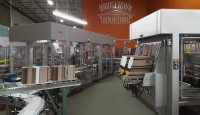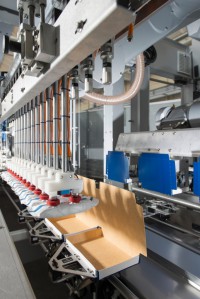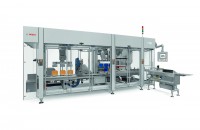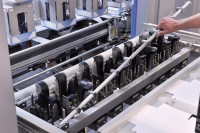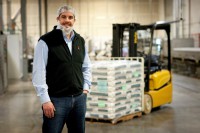Syntegon Technology GmbH
Automation as an intelligent pioneer for growth
In order to optimize packaging efficiency, US-based company Bridgetown Natural Foods invested in Sigpack TTM1 topload cartoners from Bosch Packaging Technology. Thanks to automation with these systems, productivity has increased since there are fewer scheduled and unplanned downtimes.
The sugar and confectionery sector of the USA covers an estimated 1,550 companies. In the US chocolate market, alongside global manufacturers such as Hershey, Mars and Lindt & Sprüngli, another 12.4 % of smaller, local companies are active. More and more of these focus their production on chocolate, muesli and granola bars as well as similar products. Manufacturers push for this market for good reason: bars are on the rise. Because of their handy size, they are an ideal every day snack and perfectly suit the on-the-go lifestyle of younger generations.
Bars and the like do, however, pose a constant challenge: customers expect new products at regular intervals, in different sizes and with seasonal variations. Therefore, production and primary packaging processes are almost completely automated. This means that consistent quality can be guaranteed, which in turn has a positive effect on the brand image. Automated secondary packaging equipment works reliably and efficiently. In addition, flexible format change concepts enable manufacturers to react quickly to changing market requirements. Despite growth, many SMEs ask themselves to what extent conversion to automated secondary packaging is cost-effective.
Automation enables flexible reaction to competition, market dynamics and constantly changing requirements. Increasing flexibility also raises the efficiency of the entire packaging process: this means that the high speeds of primary packaging can be adopted into secondary packaging.
A good example for successful automation of secondary packaging is Bridgetown Natural Foods, Portland / Oregon, a rapidly growing US pro-duction partner. The company is active in the demanding production and packaging market for organic and gluten-free products as well as for natural snacks. Bridgetown is respon-ding to growing production requirements and rising industry standards with a higher degree of automation of its packaging processes.
Better linkage allows higher output
Adherence to high production standards is not only relevant to the safety of people and products, it also has direct economic implications. Automation can fulfil strict quality requirements and minimize errors. Because in contrast to a person, a machine can perform long-term, monotonous work and simultaneously deliver reliable, consistent quality. Compared to automated processes, operating errors may cause expensive product waste and unplanned downtime or, in the worst case, costly product recalls, which can damage the image of the manufacturer.
Stricter regulations in the food industry demand a new definition of high standards. There are already various regulations covering hygiene (VDI Guideline 4066), certifications of hygienic production (EHEDG), the HACCP system and ISO certifications. In the case of Bridgetown, adherence to the high standards for the production of organic and gluten-free foods is vital for production. Hygienic protection can only be guaranteed once the bar is securely flow wrapped. The automation of the subsequent secondary packaging also contributes to optimal compliance with hygiene standards.
Many SMEs still rely on manual loading, particularly when it comes to secondary packaging. Ever more efficient primary packaging technologies often generate a feedback effect: the secondary packaging cannot handle the production speed of the flow wrapper. Bridgetown initially optimized the primary packaging equipment and then realized that the secondary packaging was no match for the high output. In order to increase the overall equipment effectiveness, the company invested in Sigpack TTM1 topload cartoners from Bosch Packaging Technology.
Quicker batch changes without great initial effort
Thanks to the higher level of automation, the company was able to increase productivity, as fewer planned and unplanned downtimes occurred. Higher output was also made possible thanks to synchronizing first and secondary packaging. Now, with the primary packaging equipment a higher clock rate can be run because of the consistent high performance of the Sigpack TTM1 machines. As a result, productivity has increased. At Bridgetown, products are packaged in 24-hour operation safely in up to 90 cartons per minute. Unplanned downtimes are avoided thanks to the careful carton forming process and the 100 % carton control.
Flexibility is increasingly important for companies of all sizes, enabling them to remain competitive and react to changing requirements on the market. At Bridgetown, for example, flexibility was a central requirement for the contract partner because of its broad customer portfolio. The patented format change concept of the Sigpack TTM1 enables fast, easy and tool-less format changes. A vertical restart happens within a few minutes without requiring extra time for fine adjustments.
A high degree of automation has the advantage of quicker, more flexible batch changes without great initial effort or loss of quality following change overs. The Sigpack TTM1 meets the needs of just this flexibility, fulfilling the requirements of small and medium-sized operations in the food industry with its various tasks and numerous batch and product changes.
For medium-sized companies and also co-packer operations such as Bridgetown which produce and package for different customers, the Sigpack TTM1 cartoner is an investment in the future. “We are very satisfied,” says CEO Dan Klock. “Thanks to the consistently high performance of the Sigpack TTM1, we could significantly increase our overall equipment effectiveness.” •

